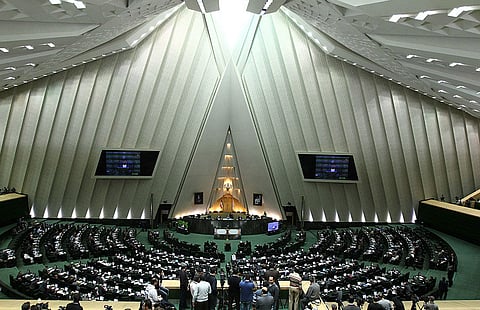

Iran’s parliament, officially known as the Islamic Consultative Assembly, is set to convene on Sunday to deliberate an emergency plan that could see Tehran withdraw from the nuclear Non-Proliferation Treaty (NPT). The meeting marks a critical moment in Iran’s nuclear policy amid rising tensions with Western powers and renewed snapback sanctions being enforced this month.
Alireza Salimi, a member of the parliament’s presiding board, announced in an interview with the Tasnim News Agency that the National Security and Foreign Policy Committee will present a report outlining potential countermeasures Iran could adopt. Among the most consequential measures under review is a formal withdrawal from the NPT, which Tehran ratified in 1970. The Guardian Council, the body responsible for reviewing and approving parliamentary legislation, will also attend the session in anticipation of a potential vote. Should the emergency plan pass, it would move directly to the desk of President Massoud Pezeshkian for final approval.
Earlier this week, Iran’s Foreign Ministry spokesman stated that the government would not resist any parliamentary decision to leave the NPT. However, in remarks delivered on Saturday, Foreign Minister Abbas Araghchi revealed that Tehran and the International Atomic Energy Agency (IAEA) are close to finalizing a new framework agreement, prompting criticism from factions within Iran’s political establishment. Some lawmakers have accused the IAEA of colluding with Israel, alleging that the agency provided intelligence that enabled attacks on Iranian nuclear facilities and assassinations of nuclear scientists during the recent 12-day conflict.
Following that conflict, parliament passed an emergency law suspending cooperation with the IAEA. Despite this, Tehran has maintained a channel of dialogue with the agency in hopes of establishing new terms for inspections and oversight. Should Iran formally withdraw from the NPT, it would end all communication with the IAEA and release Tehran from its treaty obligations, including inspections and disclosure requirements.
Analysts warn that such a move could heighten the risk of further confrontation in the region. Observers in Tehran suggest that withdrawal from the treaty might provide the United States and Israel with a casus belli for a renewed round of attacks, a possibility that many in Iran’s leadership already view as increasingly likely regardless of Sunday’s outcome.